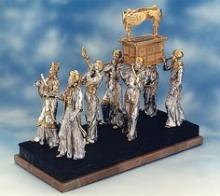Shabbat Shalom and welcome to Judeo Talk. The Torah portion for this week is Parsha Bamidbar, Numbers 1:1- 4:20.
After the long slog through the specifics of the law in Leviticus, we finally come to the book of Numbers. Now is as good a time as any to discuss the difference in the names of the books of the Torah. "Bamidbar" doesn't translate as "Numbers". In fact, none of the English names for the books are translations of the original Hebrew names. In this case Bamidbar (all parshiot at the beginnings of each book share the name with the corresponding book) translates as "In the wilderness". The reason for this name is not thematic, but merely where the word resides in the book. All of the Five Books are named for what I will call the first "strong" word in the opening portion. In the case of Numbers, the opening line is, "God spoke to Moses in the wilderness." There is hardly a more common phrase in the Torah than "God spoke to Moses". If we counted that phrase as being strong enough for a name, a significant chunk of the parshiot would be called "yidaber Adonai el-Moshe".
This naming convention is simply a culture-specific thing. When the Torah came to the West, Greek and Roman sources gave them names based on general themes, even if they got the themes wrong. While "Genesis" is a fairly accurate theme-title for the story of how everything began, the name "Exodus" really only covers the last little fragment of the story. Indeed more time is spent in the book of Exodus getting in to Egypt that is spent escaping from it. The name "Numbers" comes from the general trend of this book to count the people of Israel and assign them tasks.
Parsha Bamidbar does a few important things. First, it gives us the rough number of Israelites traveling through the desert at the two-year mark after leaving Egypt. The number is something of an estimate, though. God tells Moses only to count the war-able men over the age of 20 from each tribe. Counting women, children and the physically disabled, we can assume they numbered well over one million.
From this census, God appoints the nassim, the princes of the tribes. It is unclear what authority these princes would have, but that's not really the point right now. The most conspicuous element of this parsha is the fact that the entire tribe of Levites has been set aside. They weren't counted among the regular census because God has a special task for them. Originally, the physical components of worship, i.e. the tabernacle and the menorah, were put under the care of the first born of every tribe. The Torah reasons that since this system resulted in the fiasco of the golden calf, it was probably too chaotic. Now the accouterments of ritual have been put under the guardianship of the Levites. Because there are more first-born than total Levites, the remainder of first-born are forced to pay a tithe for the release of responsibility.
At this point in the Torah, we have the beginnings of a caste system. The Kohanim, descended from Aaron, have been dubbed the priests. The Levites have essentially now been enlisted as templars. They protect the holy items of the culture and make sure that no unauthorized individuals come into the tabernacle. They will never be called to war as a result. They will march and camp in a specific formation, each particular House in the tribe given its own holy item to protect.
Once again, we find the Israelites moving closer to order in the chaos of the wilderness. While caste systems are unnecessary in the modern day, they had an appeal to them in ancient times. With no concept of universal, standardized education, most people learned their professions by training from a very young age. By allotting tasks to entire tribes, the Israelite caste system made sure that important jobs were performed properly. In the old system, only the first born son of a first born son would have hope of proper training. The lesson of this parsha is to always be aware of your resources and do your best to apply them effectively. The lesson may not have much heart, but practicality has its place in life.
